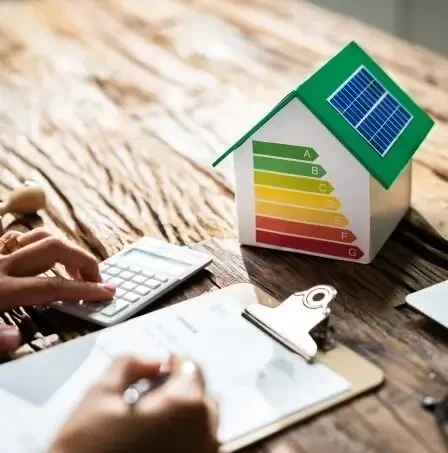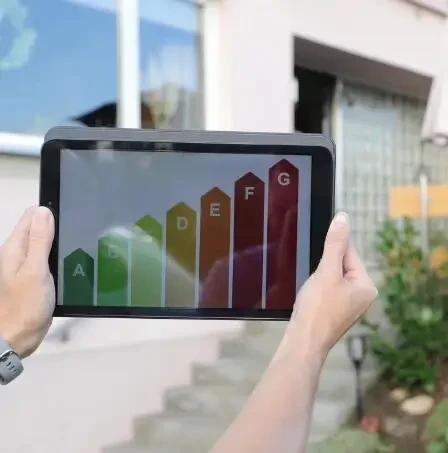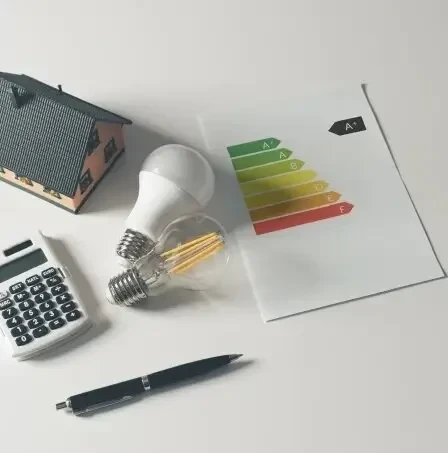In this guide, we’ll show you how to get a better rating in your EPC.
The EPC was first introduced in 2007. At the time it applied to domestic properties with 4 or more bedrooms. Over time EPCs were extended to smaller homes and rentals.
In 2015 commercial properties were required to have an EPC. Three years later in 2018 a minimum EPC rating of E (on a scale of A to G) was mandated for all rental properties, as well as for home sales.
If you’re planning to sell your home you need to have an EPC to show to buyers.
It must have a rating of at least an E on the A to G scale. If you rent properties each residence you own must have an EPC.
You can be fined anywhere from £500 to £5,000 if you fail to make an EPC available to a prospective tenant or buyer.
There are a number of exemptions although most do not apply to the average homeowner or landlord.
Those exemptions are:
● Temporary structures intended to last less than 2 years.
● Listed buildings if compliance would require altering the building’s character.
● Places of worship and places used for religious activities.
● Standalone buildings with less than 50 sqm of floor space.
● Holiday homes rented for less than 4 months a year.
● Industrial sites and agricultural buildings.
● Residential buildings that are used less than 4 months per year.
● Properties due to be demolished.
Whats on an EPC certificate?
All current EPCs include the following information:
The first page of an EPC shows your properties current and potential energy bills. Renters and prospective buyers can use this information to help determine what their energy costs are likely to be.
These do not include the cost of running your appliances.An EPC shows how much could be saved if the energy rating of the property were improved.
The energy efficiency rating is also included on the first page. An “A” rating is the highest and “G” the lowest.
Currently, a minimum rating of at least E is required to rent or sell your property. A chart shows the potential rating improvement if recommended upgrades are performed.
Note: The minimum requirements are expected to rise from E to C. The maximum fine for non-compliance is also expected to rise from £5,000 to £30,000.
This page shows the breakdown of the energy efficiency of components such as heating, hot water and lighting. This helps potential renters and buyers compare your property to others.
This section examines the structure and heat consumption. It shows you how much heat a buyer or renter can expect to use and makes recommendations for reducing heat loss.
On the recommendations page the you’ll find the Accredited Energy Assessor
recommendations for enhancing your energy performance rating.
They are listed in order of their importance. Estimated savings are based on the
assumption improvements will be undertaken in the same order.
It is not mandatory to make the recommended upgrades. If you’re planning to rent or sell your property you need to ensure your property at least an E rating.
The final section of the EPC lists steps that could enhance the energy performance of your property. Suggestions range from heat pumps to solar panels.

How to Get a Better EPC Rating in 7 Steps
This is one of the most common recommendations for improving energy efficiency, especially when it comes to older homes. Houses built before 1930 were not built with cavity walls so have to have external wall insulation.
If your home has old-fashioned single-pane windows you can enhance your EPC rating by replacing them with double or triple-glazed windows. A cheaper option is to get them treated with a coating to improve their insulation capabilities.
Light Emitting Diodes or LEDs produce clean, largely glare-free light while consuming only a tiny fraction of the energy of standard incandescent light bulbs.They also emit virtually no heat and they can last 20 years or more. If you have a large home the energy and financial savings from converting to LED lights could be significant.
Heat rises and 25% of heat is lost through your roof. If the loft in your home is not properly insulated it’s a quick, easy and cheap fix for you. By installing insulation in the loft you can prevent heat loss, reduce your energy consumption, save money and enhance your EPC rating.
Older homes typically have old-fashioned boilers that waste energy. By switching to a condensing boiler you will reduce the energy you’re currently wasting.
A condensing boiler uses hot vapour in the boilers exhaust gases to preheat circulating water.
By the time that water reaches the main tank, it is already warm and does not require as much energy to finish the heating process.
Old-fashioned thermostats needs to be manually adjusted every time conditions in the house change (leaving for work, going to sleep etc). If you forget to adjust the thermostat you can waste energy. Smart thermostats can be programmed to increase or decrease the temperature at set times. They can also can be controlled via a smartphone app - so you can control your
thermostat when your away from your home.
Another popular choice is Solar Panels. The technology has progressed and become mainstream alternative source of energy for homeowners. Installing solar panels can improve your EPC rating.

Get in Touch with Energy Performance Certificates Today
If you plan on renting or selling a property, the law requires you have an energy performance certificate with a minimum EPC rating of E.Failure to achieve that rating or to provide a potential renter or buyer with an EPC can result in fines.
An Accredited Domestic Energy Assessor from Energy Performance Certificates can help you fulfil your EPC obligations and show you how to get a better EPC rating. To learn more or to schedule an appointment call 0203 397 8220 today, or fill out the contact form on our website.
